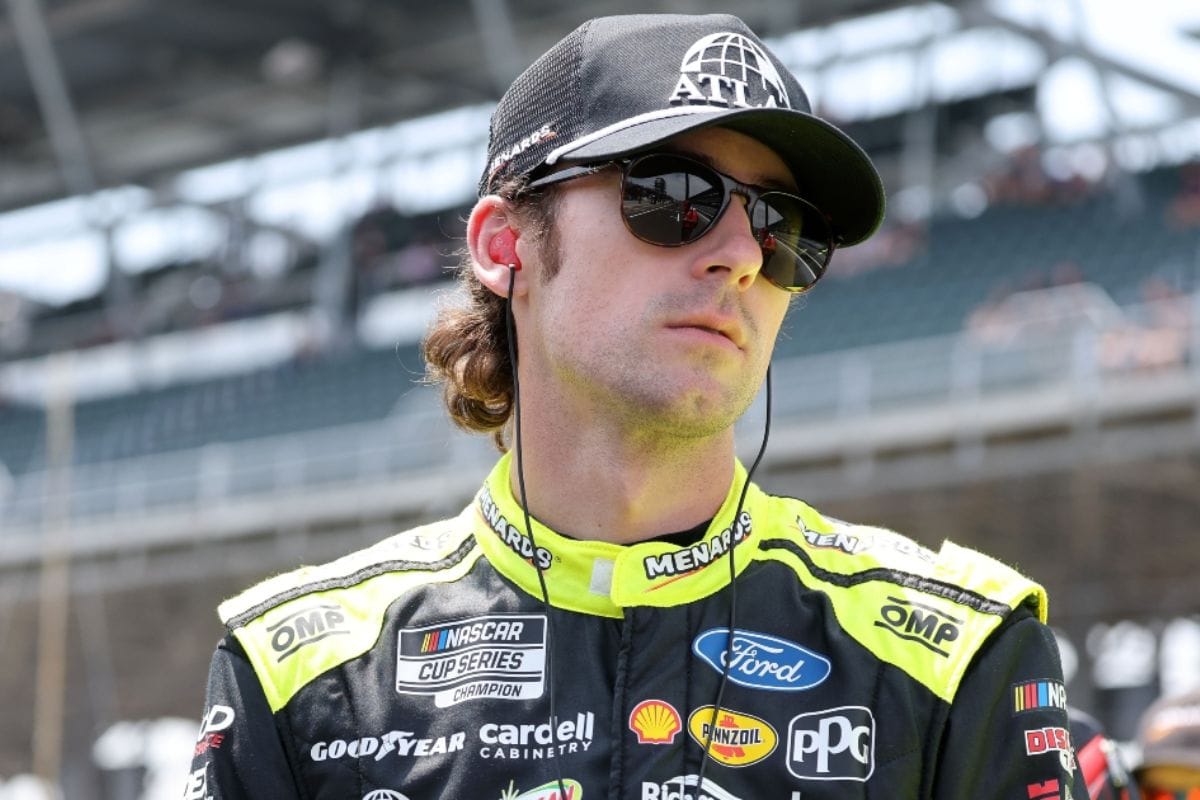Ryan Blaney’s Radio Rant at Kyle Larson: Ryan Blaney‘s recent radio tirade directed at Kyle Larson during the Brickyard 400 serves as a reminder of the emotional turbulence inherent in competitive racing. Labeling Larson a “f*ing golden boy” not only reflects Blaney’s frustration with his own misfortunes but also raises questions about the strain athletes face such situations. His subsequent regret highlights the thin line between expressing genuine feelings and maintaining professionalism. As we unpack this incident, it becomes crucial to reflect on the broader implications of such outbursts on the sport and its athletes. What does this reveal about the mental landscape of NASCAR competitors?
Key Highlights
- Ryan Blaney’s radio outburst during the Brickyard 400 targeted Kyle Larson, expressing frustration over perceived favoritism.
- Blaney described his outburst as an emotional release, a “blow-off valve” for frustration in high-pressure situations.
- The incident arose during a red flag, highlighting strategic challenges and competitive tension in racing.
- Blaney felt heartbroken after tactical misfortunes allowed Larson to surge ahead, sparking discussions on race fairness.
Ryan Blaney’s Radio Outburst
Ryan Blaney’s recent radio outburst during the Brickyard 400 has sparked considerable debate, revealing the intense emotions and vital stakes that characterize competitive racing. In a high-stress environment like NASCAR, where every decision can have far-reaching consequences, driver reactions often serve as a window into the psychological complexities of the sport. Blaney’s choice of words, referring to Kyle Larson as a ‘f*ing golden boy,’ emphasizes not only his frustration but also the competitive tension that often simmers just beneath the surface.
The incident occurred during a red flag situation after a wreck, where positioning and tactical decisions become paramount. Blaney’s outburst reflects the acute awareness drivers have of their rivals and the stakes involved in vying for supremacy on the track. His comment suggests a perception of favoritism or privilege associated with Larson, a sentiment that many drivers harbor in an environment where performance is closely scrutinized. Such moments of raw emotion can resonate deeply with fans, eliciting both empathy and criticism.
While Blaney later expressed regret over his remarks, this episode highlights a vital aspect of racing culture—vulnerability in the face of competition. It serves as a reminder that behind the helmets and fame, drivers are human, grappling with intense demands that can lead to impulsive reactions.
Blaney’s Explanation of Outbursts
Ryan Blaney unpacked the nature of his radio outbursts, describing them as vital moments for emotional release that enable him to move forward in the high-pressure environment of NASCAR racing.
By characterizing these moments as a “blow-off valve,” Blaney articulated the necessity of expressing frustration to maintain focus on the race. This perspective sheds light on the mental demands faced by drivers, where emotional regulation is fundamental for peak performance.
Blaney’s assertion that he does not hold grudges suggests a conscious effort to compartmentalize negative feelings, thereby preserving mental clarity. He emphasized the transient nature of his anger, stating, “I get it out and then I’m over it in 10 seconds.” This rapid emotional reset is a tactical approach that allows him to refocus on the task at hand rather than dwell on grievances that could distract him during critical moments on the track.
“I try not to hold grudges. These outbursts are like a blow-off valve for me. I get it out, and then I’m over it in 10 seconds.”
“I don’t think it ever hurts my performance. It’s just a way for me to reset and move on quickly.” – Blaney

Furthermore, Blaney acknowledged that while he regrets the necessity of these outbursts, they are inherently part of his personality. His frank admission highlights the human element of racing, where emotions run high, and the ability to manage them can be a determining factor in performance.
“I wish I didn’t have it, but it’s just part of me. I get it out, reset, and move on.” – Blaney
Blaney’s Misfortune at Brickyard 400
What seemed to be a promising opportunity for victory at the Brickyard 400 quickly turned into a disappointing outcome for Blaney, as a series of unfortunate events unfolded during the final restarts. After a strong performance throughout the race, Blaney found himself in prime position to seize the win. However, the dynamics shifted dramatically due to factors beyond his control.
- Fuel Mismanagement by Keselowski: As the race neared its resolution, Brad Keselowski ran out of fuel, inadvertently opening the door for Blaney.
- Tactical Positioning: Instead of capitalizing on this opportunity, Blaney’s chance to overtake was compromised as Kyle Larson surged past him, taking advantage of the chaos.
- Rule Implications: Blaney expressed frustration over the rules that allowed a place driver to benefit from the misfortunes of the leader, suggesting that it promotes unfair advantages.
- Emotional Toll: Following the race, Blaney conveyed his disappointment succinctly, stating, “I don’t know. I’m just upset. That’s a heartbreaker. We did everything right today. I was in prime position to win and it just didn’t work out for us. Just got unlucky.”
“With this, you’re promoting the third-place guy before the second-place if the leader has problems. That’s not right.” – Blaney
This combination of misfortune and tactical misalignment left Blaney feeling heartbroken. His remarks not only depicted his discontent with the outcome but also hinted at a broader discussion regarding the fairness of race regulations.
Blaney’s Current Standing
Currently positioned fifth in the NASCAR Cup Series standings, Blaney’s consistent performance with 7 top 5 and 11 top 10 finishes highlights his competitiveness this season despite recent setbacks. His resilience has been a hallmark of his approach, as he navigates the challenges that accompany racing. The No. 12 car, backed by Team Penske, has shown both speed and reliability, allowing Blaney to remain in the race as the season progresses.
Analyzing Blaney’s recent races, one can identify a pattern of tactical racing and adaptability. His ability to secure podium finishes, including a third-place finish at the Brickyard 400, emphasizes his skill in capitalizing on opportunities while managing risks. However, the radio outburst directed at Kyle Larson indicates underlying tensions that could affect performance if not addressed. The emotional roller coaster of racing can lead to impulsive reactions, which may inadvertently impact focus and strategy in future competitions.
As the season approaches its climax, Blaney must utilize his strengths—particularly his adeptness in adapting to varying track conditions and competing against formidable opponents. With the playoffs looming, his current standing positions him well, but he must remain vigilant. The balance between aggression and caution will be key to advancing further in the championship hunt.
News in Brief: Ryan Blaney’s Radio Rant at Kyle Larson
The incident involving Ryan Blaney’s radio outburst during the Brickyard 400 serves as a poignant reminder of the emotional complexity inherent in competitive sports.
While the frustration directed at Kyle Larson revealed the demands faced by drivers, it also highlights the necessity for emotional management in high-stakes environments.
The acknowledgment of regret signifies an understanding of the broader implications of such reactions, emphasizing the delicate balance between passion and professionalism that athletes must navigate in their careers.
ALSO READ: Ryan Blaney’s Indianapolis Disclosure on Social Media After Dramatic Brickyard 400 Race



